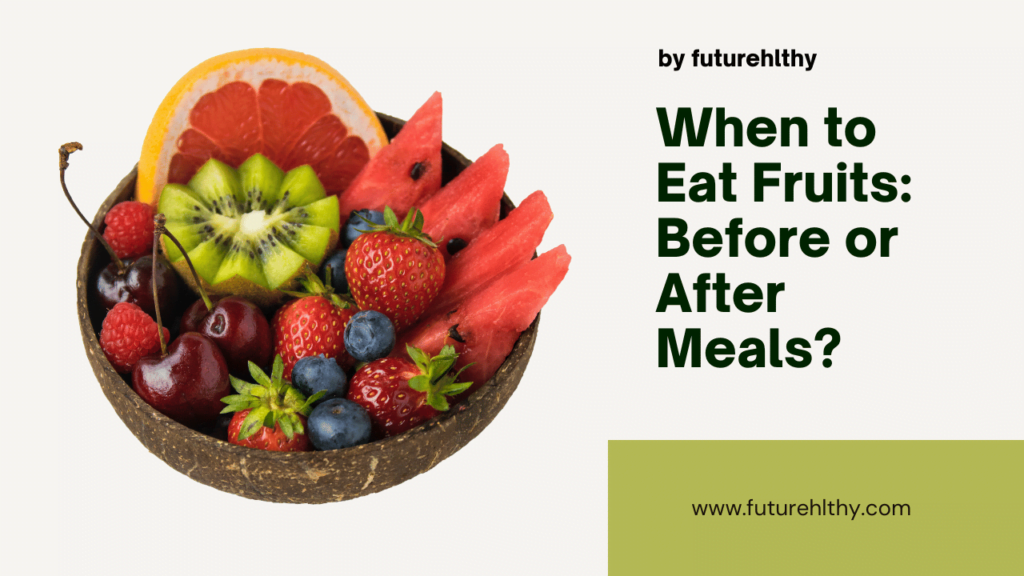When to Eat Fruits Before or After Meal? A Simple Guide

Eating fruits is essential for a healthy diet. They are packed with vitamins, minerals, and fiber. These nutrients help boost your immune system, improve digestion, and keep your body strong. But when is the best time to eat fruits? Should you eat them before or after a meal? This guide will explore both options, provide helpful tips, and offer evidence-based advice for better health.
Table of Contents:
- Introduction
- Why Fruits Are Good for You
- Eating Fruits Before Meals
- Eating Fruits After Meals
- What Science Says
- Best Ways to Eat Fruits
- Common Questions About Eating Fruits
- Conclusion
1. Introduction
Fruits are a natural source of energy and nutrition. They play a key role in a balanced diet, supporting your overall health. However, there’s a debate about the best time to eat them. Some people suggest eating fruits before meals, while others believe it’s better to eat them afterward. In this article, we’ll look at the benefits and downsides of each option.
2. Why Fruits Are Good for You
Fruits are full of essential nutrients, including:
- Vitamins: Like Vitamin C in oranges and Vitamin A in mangoes, which support your immune system and skin health.
- Minerals: Such as potassium in bananas and magnesium in avocados, which help control blood pressure and muscle function.
- Antioxidants: These protect your body from harmful molecules called free radicals, reducing the risk of chronic diseases.
- Fiber: Found in all fruits, fiber aids digestion, helps control weight, and lowers the risk of heart disease.
Knowing the benefits of fruits is important, but understanding when to eat them can help you maximize these benefits.
3. Eating Fruits Before Meals
a. Better Digestion
Many people believe eating fruits before meals improves digestion. Fruits are high in fiber and water, which can prepare your stomach for the meal ahead. Eating them on an empty stomach allows your body to absorb nutrients more effectively.
b. Weight Control
Eating fruits before a meal might help with weight control. Fruits are low in calories and high in fiber, making you feel fuller. This can reduce your hunger and help you eat less during your meal.
c. Blood Sugar Management
Some research shows that eating fruits before meals can help keep your blood sugar levels stable. The fiber in fruits slows down the absorption of sugar, preventing sharp spikes in blood glucose levels. This is especially helpful for people with diabetes or those watching their blood sugar.
4. Eating Fruits After Meals
a. Improved Nutrient Absorption
Some experts suggest that eating fruits after meals can help your body absorb nutrients better. When you Eat Fruits after a meal with fats, your body can absorb fat-soluble vitamins, like Vitamin A, more effectively.
b. Satisfying Sweet Cravings
Fruits can also satisfy your sweet tooth after a meal. Instead of reaching for sugary desserts, you can enjoy fruits, which offer natural sweetness along with essential nutrients.
c. Digestive Aid
For some, eating fruits after meals can help with digestion. The fiber in fruits helps process heavier meals, promoting regular bowel movements and preventing constipation.
5. What Science Says
a. Digestion and Timing
A study published in the journal Appetite looked at how eating fruits before or after a meal affects digestion. The researchers found that eating fruits before meals slightly sped up digestion, but the difference was small. The study concluded that the timing of fruit consumption has little impact on digestion for most people.
b. Blood Sugar Levels
The American Journal of Clinical Nutrition studied the effects of eating fruits before and after meals on blood sugar levels. The study found that eating fruits before a meal helped regulate blood sugar better than eating them afterward. This was especially true for people with insulin resistance or diabetes.
c. Nutrient Absorption
Research in the Journal of Nutrition examined how the timing of eating fruits affects nutrient absorption. The study found that eating fruits after a meal with fats improved the absorption of vitamins like Vitamin A. This suggests that when you eat fruits can affect how well your body absorbs certain nutrients.
6. Best Ways to Eat Fruits
There’s no one-size-fits-all answer to when you should eat fruits. Here are some tips to help you decide what works best for you:
a. Listen to Your Body
Pay attention to how your body reacts when you eat fruits before or after meals. Some people may find it easier to digest fruits on an empty stomach, while others might prefer to eat them after a meal.
b. Pair Fruits with Healthy Fats
To improve nutrient absorption, consider pairing fruits with healthy fats. For example, add avocado slices to a fruit salad or drizzle olive oil over mixed fruits. This can help your body absorb fat-soluble vitamins.
c. Choose Whole Fruits
Whether you eat fruits before or after meals, whole fruits are the best choice. They contain more fiber and fewer added sugars compared to fruit juices or processed fruit snacks.
d. Consider Your Health Goals
If you’re focused on weight management or blood sugar control, eating fruits before meals might help. On the other hand, if you want to improve nutrient absorption, eating fruits after meals may be better.
e. Eat a Variety of Fruits
Include different types of fruits in your diet to ensure you get a range of nutrients. Each fruit offers unique vitamins, minerals, and antioxidants, so aim for a colorful mix.
7. Common Questions About Eating Fruits
a. Can Eating Fruits Before Meals Cause Stomach Issues?
Most people can eat fruits before meals without any problems. However, some may experience bloating or discomfort. If this happens, try eating fruits after a meal or in smaller amounts.
b. Is It Best to Eat Fruits in the Morning?
Eating fruits in the morning can give you a quick energy boost. The natural sugars in fruits provide energy, while the fiber helps keep you full. But fruits can be enjoyed any time of day, based on your schedule and preferences.
c. Can I Eat Fruits with Other Foods?
Yes, you can combine fruits with other foods to create balanced meals. For example, add fruits to yogurt, oatmeal, or salads. Pairing fruits with protein or healthy fats can help keep your blood sugar levels stable.
d. Should I Avoid Certain Fruits After Meals?
Most fruits can be eaten after meals without issues. However, some people may find that acidic fruits like oranges or pineapples cause heartburn or acid reflux when eaten on a full stomach. If this happens, eat these fruits separately or in smaller portions.
e. How Much Fruit Should I Eat Daily?
The recommended daily intake of fruits depends on factors like age, gender, and activity level. Generally, aim for at least 2-3 servings of fruits per day. Adjust this based on your health goals and dietary needs.
Conclusion
Whether you eat fruits before or after meals depends on your health goals and personal preferences. Both options offer unique benefits, from improved digestion and blood sugar control to better nutrient absorption. The most important thing is to include a variety of fruits in your diet to enjoy their numerous health benefits.
By understanding the pros and cons of different timing options and following these tips, you can make informed decisions about when to eat fruits for your best health.
see more : Top Foods for Summer 2024
Sources:
- Appetite Journal Study on Fruit Timing
- Journal of Nutrition on Nutrient Absorption

Alex Morgan
Alex Morgan focuses on stress management, mindfulness, and emotional well-being. Their content provides approachable, supportive guidance for everyday mental health.




generally lost just trying to figure out how to begin. Any ideas or tips?
It’s generally better to eat fruits before meals rather than right after. Eating them on an empty stomach or about 30 minutes before a meal helps with digestion, keeps you from overeating, and allows your body to absorb vitamins and fiber more effectively.
Best times to eat fruits:
Morning (on an empty stomach)
As a light snack between meals
30 minutes before lunch or dinner